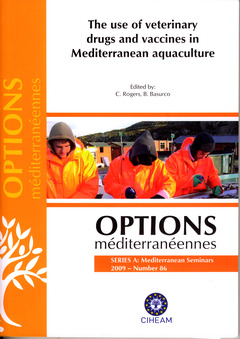Description
The use of veterinary drugs and vaccines in Mediterranean aquaculture (Options méditerranéennes series A : Mediterranean Seminars 2009 Number 86)
Authors: ROGERS C., BASURCO B.
Language: English
Subjects for The use of veterinary drugs and vaccines in...:
Approximative price 38.11 €
Subject to availability at the publisher.
Add to cart
Publication date: 10-2009
222 p. · 17x24 cm · Paperback
222 p. · 17x24 cm · Paperback
Description
/li>
Together with the increase in Mediterranean aquaculture production in recent years, the number of diseases diagnosed and pathogens detected among farmed aquatic species has also increased considerably. In order to control diseases and to improve production, farmers use various external resources including chemicals, veterinary drugs, vaccines, immunostimulants, etc. Although important developments have been achieved in vaccine production, some operations still depend on the use of veterinary drugs, and responding to the increasing concerns of environmental sustainability and consumer preference for safe food the sector has begun to realize the potential risk associated with the irresponsible use of these products.
In May 2003 an International Seminar on "The use of veterinary drugs and vaccines in Mediterranean aquaculture" was jointly organized by the CIHEAM and the FAO in Izmir (Turkey), with the collaboration of the Ministry of Agriculture and Rural Affairs of Turkey, and the Turkish Fisheries Foundation. The seminar reviewed and compiled a significant amount of valuable information on the subject. This publication contains 17 of the 24 contributions presented at the Seminar, dealing with different topics related to disease management in aquaculture. Considering the quality of the manuscripts and the fact that most of the information provided is still relevant six years on, this publication is an important reference on the subject, in particular for the Mediterranean, where there is a lack of information in this field of expertise.
In May 2003 an International Seminar on "The use of veterinary drugs and vaccines in Mediterranean aquaculture" was jointly organized by the CIHEAM and the FAO in Izmir (Turkey), with the collaboration of the Ministry of Agriculture and Rural Affairs of Turkey, and the Turkish Fisheries Foundation. The seminar reviewed and compiled a significant amount of valuable information on the subject. This publication contains 17 of the 24 contributions presented at the Seminar, dealing with different topics related to disease management in aquaculture. Considering the quality of the manuscripts and the fact that most of the information provided is still relevant six years on, this publication is an important reference on the subject, in particular for the Mediterranean, where there is a lack of information in this field of expertise.
© 2024 LAVOISIER S.A.S.




